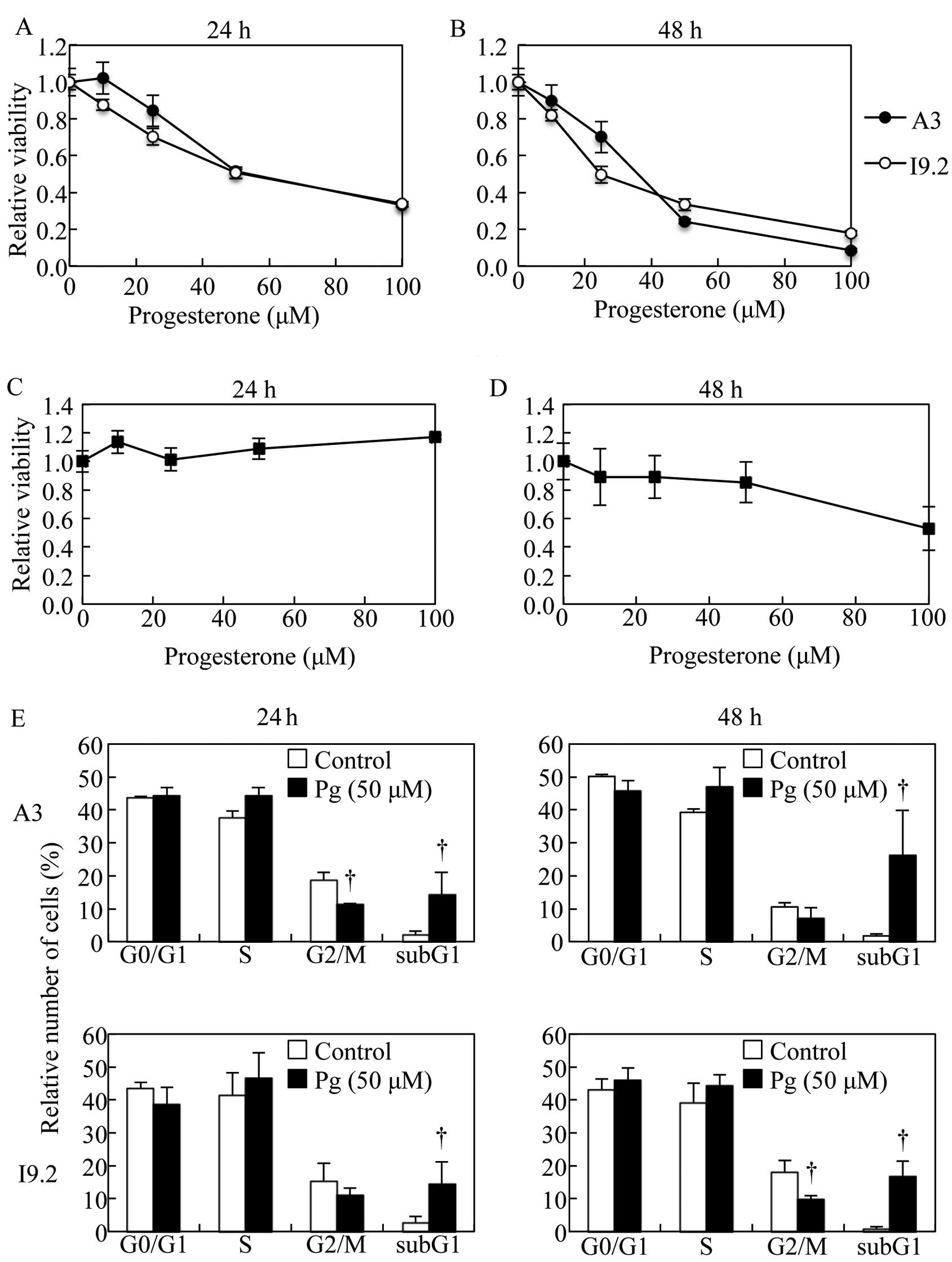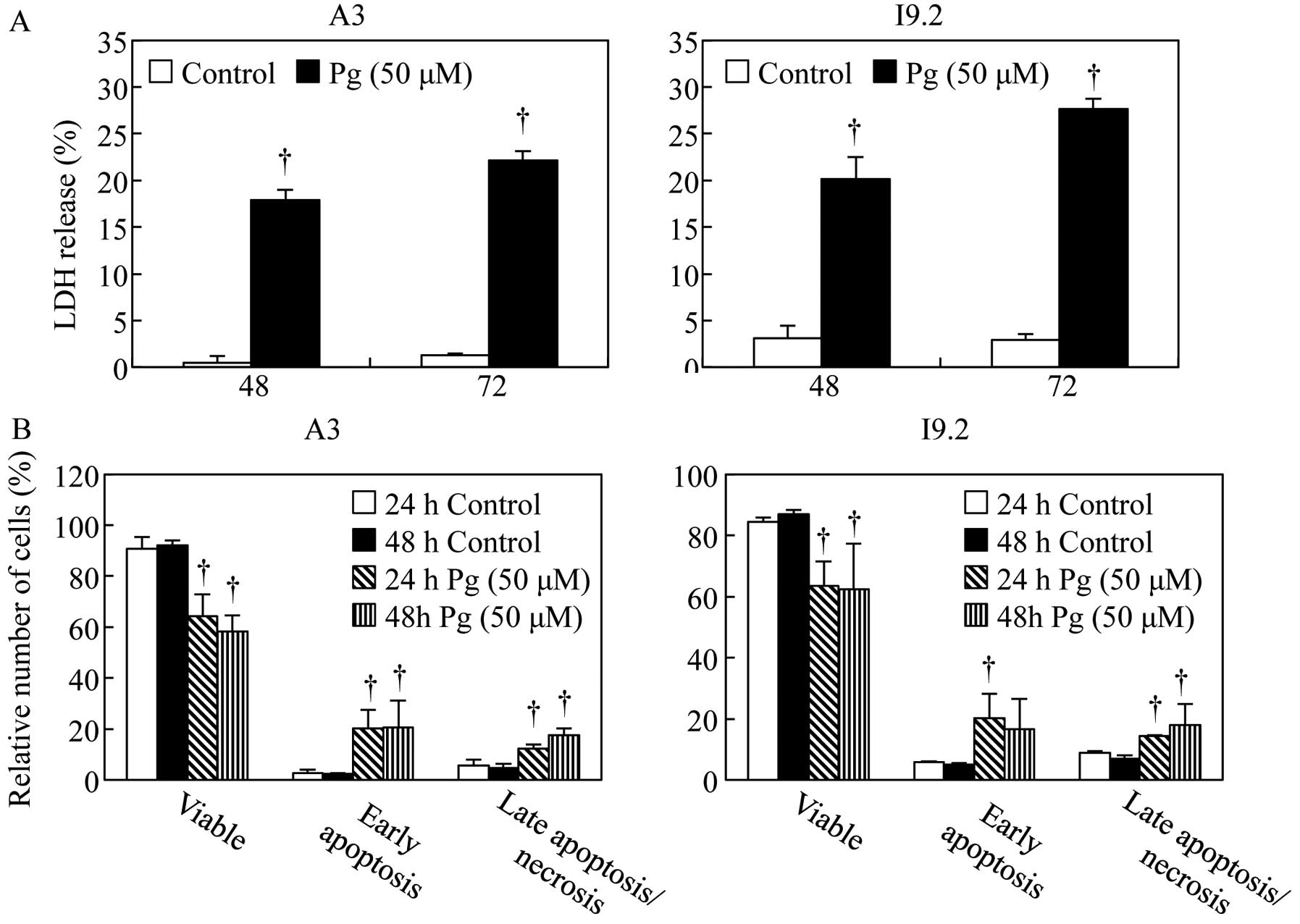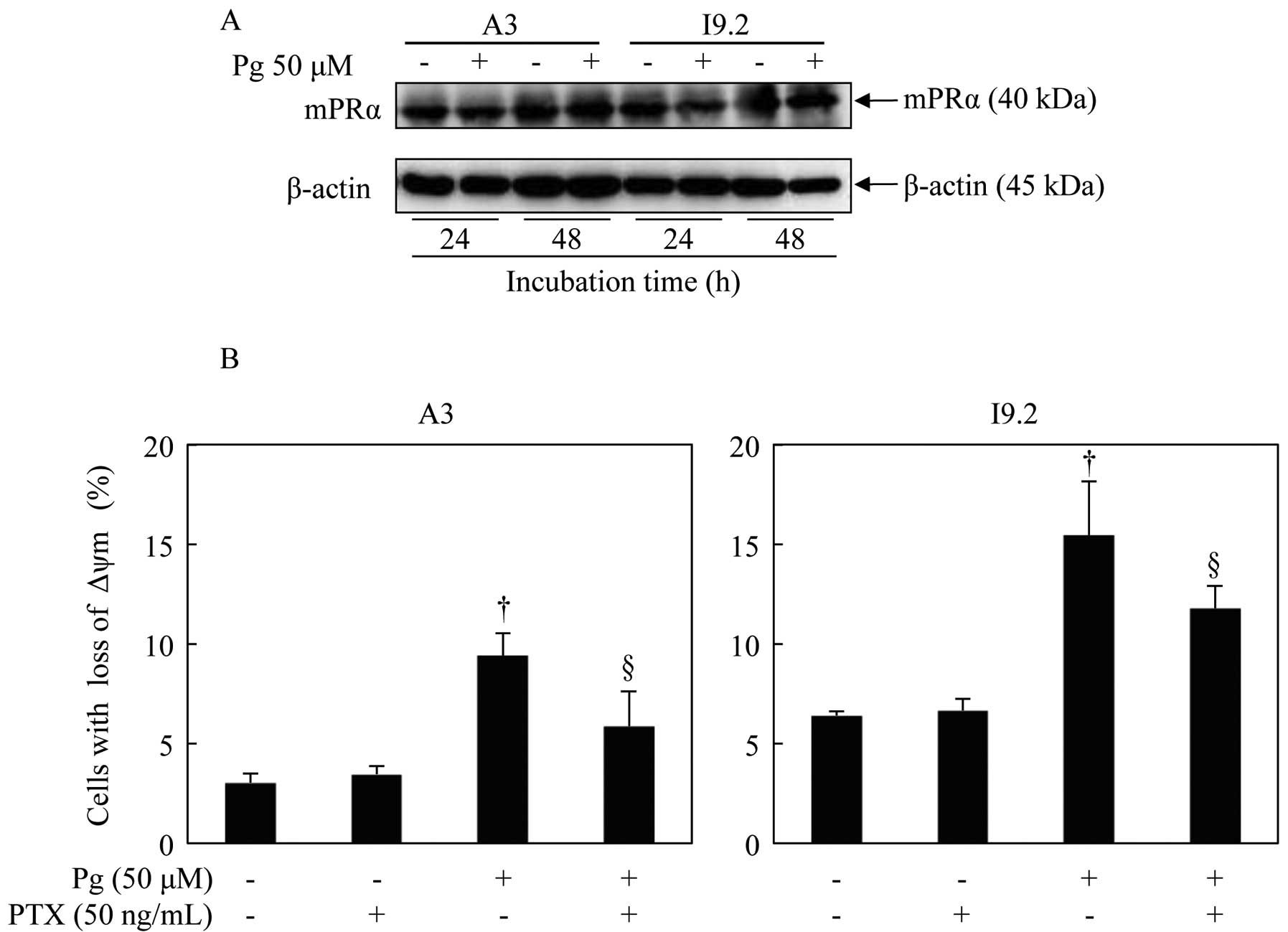|
1
|
Conneely OM, Mulac-Jericevic B, DeMayo F,
Lydon JP and O’Malley BW: Reproductive functions of progesterone
receptors. Recent Prog Horm Res. 57:339–355. 2002. View Article : Google Scholar : PubMed/NCBI
|
|
2
|
Hughes GC: Progesterone and autoimmune
disease. Autoimmun Rev. 11:A502–A514. 2012. View Article : Google Scholar : PubMed/NCBI
|
|
3
|
Matsuzaki J, Tsuji T, Imazeki I, Ikeda H
and Nishimura T: Immunosteroid as a regulator for Th1/Th2 balance:
its possible role in autoimmune diseases. Autoimmunity. 38:369–375.
2005. View Article : Google Scholar : PubMed/NCBI
|
|
4
|
Ahmad N and Kumar R: Steroid hormone
receptors in cancer development: a target for cancer therapeutics.
Cancer Lett. 300:1–9. 2011. View Article : Google Scholar : PubMed/NCBI
|
|
5
|
Hellberg D: Sex steroids and cervical
cancer. Anticancer Res. 32:3045–3054. 2012.PubMed/NCBI
|
|
6
|
Horita K, Inase N, Miyake S, Formby B,
Toyoda H and Yoshizawa Y: Progesterone induces apoptosis in
malignant mesothelioma cells. Anticancer Res. 21:3871–3874.
2001.PubMed/NCBI
|
|
7
|
Lanari C, Wargon V, Rojas P and Molinolo
AA: Antiprogestins in breast cancer treatment: are we ready? Endocr
Relat Cancer. 19:R35–R50. 2012. View Article : Google Scholar : PubMed/NCBI
|
|
8
|
Bertelsen EL, Endresen PC, Orbo A and
Sager G: Non-genomic cell growth inhibition by progesterone. cell
cycle retardation and induction of cell death. Anticancer Res.
24:3749–3755. 2004.PubMed/NCBI
|
|
9
|
Falkenstein E, Tillmann HC, Christ M,
Feuring M and Wehling M: Multiple actions of steroid hormones - a
focus on rapid, nongenomic effects. Pharmacol Rev. 52:513–556.
2000.PubMed/NCBI
|
|
10
|
Zhu Y, Hanna RN, Schaaf MJ, Spaink HP and
Thomas P: Candidates for membrane progestin receptors - past
approaches and future challenges. Comp Biochem Physiol C Toxicol
Pharmacol. 148:381–389. 2008. View Article : Google Scholar : PubMed/NCBI
|
|
11
|
Hammes SR and Levin ER: Minireview: recent
advances in extranuclear steroid receptor actions. Endocrinology.
152:4489–4495. 2011. View Article : Google Scholar : PubMed/NCBI
|
|
12
|
Ndiaye K, Poole DH, Walusimbi S, Cannon
MJ, Toyokawa K, Maalouf SW, Dong J, Thomas P and Pate JL:
Progesterone effects on lymphocytes may be mediated by membrane
progesterone receptors. J Reprod Immunol. 95:15–26. 2012.
View Article : Google Scholar : PubMed/NCBI
|
|
13
|
Dressing GE, Goldberg JE, Charles NJ,
Schwertfeger KL and Lange CA: Membrane progesterone receptor
expression in mammalian tissues: a review of regulation and
physiological implications. Steroids. 76:11–17. 2011. View Article : Google Scholar : PubMed/NCBI
|
|
14
|
Thomas P: Characteristics of membrane
progestin receptor alpha (mPRα) and progesterone membrane receptor
component 1 (PGMRC1) and their roles in mediating rapid progestin
actions. Front Neuroendocrinol. 29:292–312. 2008.
|
|
15
|
Gamberucci A, Giunti R and Benedetti A:
Progesterone inhibits capacitative Ca2+ entry in Jurkat
T lymphocytes by a membrane delimited mechanism, independently of
plasma membrane depolarization. Cell Calcium. 36:175–180.
2004.PubMed/NCBI
|
|
16
|
Dosiou C, Hamilton AE, Pang Y, Overgaard
MT, Tulac S, Dong J, Thomas P and Giudice LC: Expression of
membrane progesterone receptors on human T lymphocytes and Jurkat
cells and activation of G-proteins by progesterone. J Endocrinol.
196:67–77. 2008. View Article : Google Scholar : PubMed/NCBI
|
|
17
|
Juo P, Kuo CJ, Yuan J and Blenis J:
Essential requirement for caspase-8/FLICE in the initiation of the
Fas-induced apoptotic cascade. Curr Biol. 8:1001–1008. 1998.
View Article : Google Scholar : PubMed/NCBI
|
|
18
|
Juo P, Woo MS, Kuo CJ, Signorelli P,
Biemann HP, Hannun YA and Blenis J: FADD is required for multiple
signaling events downstream of the receptor Fas. Cell Growth
Differ. 10:797–804. 1999.PubMed/NCBI
|
|
19
|
Thomas P, Tubbs C, Detweiler C, Das S,
Ford L and Breckenridge-Miller D: Binding characteristics, hormonal
regulation and identity of the sperm membrane progestin receptor in
Atlantic croaker. Steroids. 70:427–433. 2005. View Article : Google Scholar : PubMed/NCBI
|
|
20
|
Zhu Y, Rice CD, Pang Y, Pace M and Thomas
P: Cloning, expression, and characterization of a membrane
progestin receptor and evidence it is an intermediary in meiotic
maturation of fish oocytes. Proc Natl Acad Sci USA. 100:2231–2236.
2003. View Article : Google Scholar : PubMed/NCBI
|
|
21
|
Imai M, Kikuchi H, Denda T, Ohyama K,
Hirobe C and Toyoda H: Cytotoxic effects of flavonoids against a
human colon cancer derived cell line, COLO 201: a potential natural
anti-cancer substance. Cancer Lett. 276:74–80. 2009. View Article : Google Scholar : PubMed/NCBI
|
|
22
|
Darzynkiewicz Z, Bruno S, Del Bino G,
Gorczyca W, Hotz MA, Lassota P and Traganos F: Features of
apoptotic cells measured by flow cytometry. Cytometry. 13:795–808.
1992. View Article : Google Scholar : PubMed/NCBI
|
|
23
|
Yoshino Y, Yuan B, Kaise T, Takeichi M,
Tanaka S, Hirano T, Kroetz DL and Toyoda H: Contribution of
aquaporin 9 and multidrug resistance-associated protein 2 to
differential sensitivity to arsenite between primary cultured
chorion and amnion cells prepared from human fetal membranes.
Toxicol Appl Pharmacol. 257:198–208. 2011. View Article : Google Scholar
|
|
24
|
Yuan B, Ohyama K, Bessho T and Toyoda H:
Contribution of inducible nitric oxide synthase and
cyclooxygenase-2 to apoptosis induction in smooth chorion
trophoblast cells of human fetal membrane tissues. Biochem Biophys
Res Commun. 341:822–827. 2006. View Article : Google Scholar : PubMed/NCBI
|
|
25
|
Johnson LV, Walsh ML and Chen LB:
Localization of mitochondria in living cells with rhodamine 123.
Proc Natl Acad Sci USA. 77:990–994. 1980. View Article : Google Scholar : PubMed/NCBI
|
|
26
|
Ryter SW, Kim HP, Hoetzel A, Park JW,
Nakahira K, Wang X and Choi AM: Mechanisms of cell death in
oxidative stress. Antioxid Redox Signal. 9:49–89. 2007. View Article : Google Scholar : PubMed/NCBI
|
|
27
|
Yuan B, Yoshino Y, Kaise T and Toyoda H:
Application of arsenic trioxide therapy for patients with
leukaemia. Biological Chemistry of As, Sb and Bi. Sun HZ: John
Wiley & Sons, Ltd; New York: pp. 263–292. 2011
|
|
28
|
Earnshaw WC, Martins LM and Kaufmann SH:
Mammalian caspases: structure, activation, substrates, and
functions during apoptosis. Annu Rev Biochem. 68:383–424. 1999.
View Article : Google Scholar : PubMed/NCBI
|
|
29
|
Kantari C and Walczak H: Caspase-8 and
bid: caught in the act between death receptors and mitochondria.
Biochim Biophys Acta. 1813:558–563. 2011. View Article : Google Scholar : PubMed/NCBI
|
|
30
|
Viswanath V, Wu Y, Boonplueang R, Chen S,
Stevenson FF, Yantiri F, Yang L, Beal MF and Andersen JK: Caspase-9
activation results in downstream caspase-8 activation and bid
cleavage in 1-methyl-4-phenyl-1,2,3,6-tetrahydropyridine-induced
Parkinson’s disease. J Neurosci. 21:9519–9528. 2001.PubMed/NCBI
|
|
31
|
Bamberger CM, Else T, Bamberger AM, Beil
FU and Schulte HM: Dissociative glucocorticoid activity of
medroxyprogesterone acetate in normal human lymphocytes. J Clin
Endocrinol Metab. 84:4055–4061. 1999.PubMed/NCBI
|
|
32
|
Xie M, Zhu X, Liu Z, Shrubsole M, Varma V,
Mayer IA, Dai Q, Chen Q and You S: Membrane progesterone receptor
alpha as a potential prognostic biomarker for breast cancer
survival: a retrospective study. PloS One. 7:e351982012. View Article : Google Scholar : PubMed/NCBI
|
|
33
|
Karteris E, Zervou S, Pang Y, Dong J,
Hillhouse EW, Randeva HS and Thomas P: Progesterone signaling in
human myometrium through two novel membrane G protein-coupled
receptors: potential role in functional progesterone withdrawal at
term. Mol Endocrinol. 20:1519–1534. 2006. View Article : Google Scholar
|


















